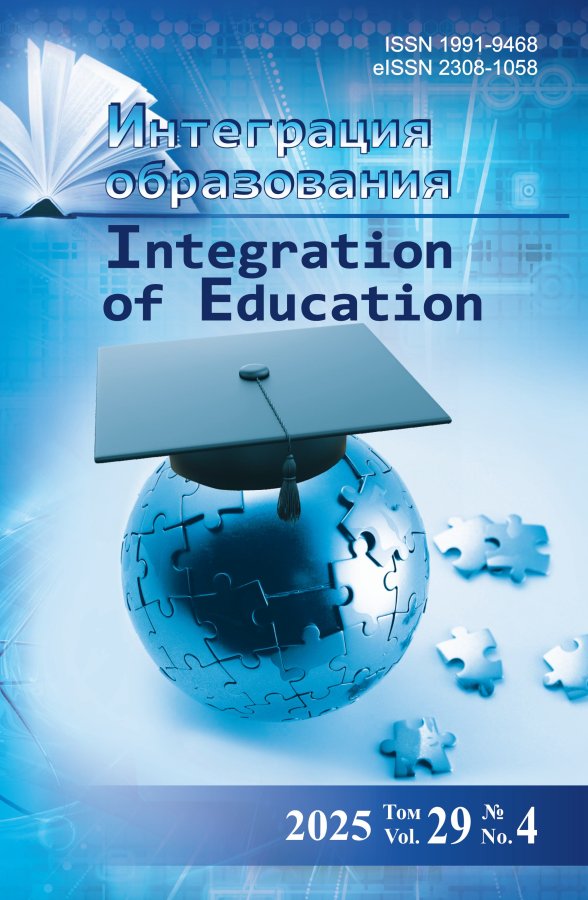Представления о статусе английского языка и академическая мотивация среди китайских студентов
- Авторы: Гу Х.1, Никитина Л.1, Каур Д.1
-
Учреждения:
- Университет Малайя
- Выпуск: Том 26, № 1 (2022)
- Страницы: 42-54
- Раздел: Международный опыт интеграции образования
- Статья получена: 20.05.2025
- Статья одобрена: 20.05.2025
- Статья опубликована: 15.02.2022
- URL: https://bakhtiniada.ru/1991-9468/article/view/292757
- DOI: https://doi.org/10.15507/1991-9468.106.026.202201.042-054
- ID: 292757
Цитировать
Полный текст
Аннотация
Введение. Статус английского языка как инструмента международного общения нашел отражение в сравнительно новом термине «глобальный английский». Существуют разные точки зрения относительно легитимности этого термина. Цель статьи – представить результаты исследования о восприятии китайскими студентами статуса английского языка как глобального и влиянии этих представлений на академическую мотивацию студентов.
Материалы и методы. В исследовании приняли участие 460 студентов, обучающихся по профилю «Английский язык как иностранный» в одном из китайских университетов. Для сбора данных авторы использовали специально разработанный опросник, который содержал несколько параметров, относящихся к восприятию статуса английского языка и академической мотивации. Студенты оценивали каждый из пунктов опросника по 5-балльной шкале. Статистический метод анализа данных включал разведочный факторный анализ и множественный регрессионный анализ.
Результаты исследования. Разведочный факторный анализ обнаружил четыре фактора (скрытых переменных) в восприятии статуса английского языка и три фактора (скрытых переменных) в академической мотивации студентов. Последующий множественный регрессионный анализ выявил положительные и статистически значимые корреляции между рядом скрытых переменных. Например, переменная «Представления об обучении английскому языку» оказывала значительное статистическое влияние на каждую из трех параметров академической мотивации.
Обсуждение и заключение. Результаты статистических анализов в данном исследовании подтверждают ранние эмпирически основанные заключения, что представления о языке и его статусе состоят из отдельных самостоятельных компонентов. Также результаты факторного анализа указывают на валидность концепции «глобальный английский». С практической точки зрения материалы статьи подчеркивают необходимость интеграции концепции «глобальный английский» в процессы преподавания и изучения английского языка. Сделанные авторами выводы вносят вклад в дальнейшее развитие практики обучения английскому языку в контексте «глобального английского».
Об авторах
Хэйюан Гу
Университет Малайя
Email: guhuiyuan60@gmail.com
ORCID iD: 0000-0002-9769-1623
аспирант факультета языков и лингвистики
Малайзия, Куала-ЛумпурЛариса Никитина
Университет Малайя
Автор, ответственный за переписку.
Email: larisa@um.edu.my
ORCID iD: 0000-0002-6061-5360
Scopus Author ID: 36701867200
ResearcherId: H-4481-2012
старший преподаватель факультета языков и лингвистики
Малайзия, Куала-ЛумпурДжагдиш Каур
Университет Малайя
Email: jagdish@um.edu.my
ORCID iD: 0000-0002-6803-5635
Scopus Author ID: 36150103400
ResearcherId: B-8685-2010
старший преподаватель факультета языков и лингвистики
Малайзия, Куала-ЛумпурСписок литературы
- He D. University Students’ and Teachers’ Perceptions of China English and World Englishes: Language Attitudes and Pedagogic Implications. The Asian Journal of Applied Linguistics. 2015; 2(2):65-76. Available at: https://fass.ubd.edu.bn/staff/docs/PH/He-2015.pdf (accessed 08.03.2021). (In Eng.)
- Galloway N., Rose H. Incorporating Global Englishes into the ELT Classroom. ELT Journal. 2018; 72(1):3-14. (In Eng.) doi: https://doi.org/10.1093/elt/ccx010
- Galloway N. Global Englishes and English Language Teaching (ELT) – Bridging the Gap between Theory and Practice in a Japanese Context. System. 2013; 41(3):786-803. (In Eng.) doi: https://doi.org/10.1016/j.system.2013.07.019
- Fang F. (Gabriel), Ren W. Developing Students’ Awareness of Global Englishes. ELT Journal. 2018; 72(4):384-394. (In Eng.) doi: https://doi.org/10.1093/elt/ccy012
- Cook V. Where Is the Native Speaker Now? TESOL Quarterly. 2016; 50(1):186-189. (In Eng.) doi: https://doi.org/10.1002/tesq.286
- Ortega L. Ontologies of Language, Second Language Acquisition, and World Englishes. World Englishes. 2018; 37(1):64-79. (In Eng.) doi: https://doi.org/10.1111/weng.12303
- Jenkins J. English as a Lingua Franca from the Classroom to the Classroom. ELT Journal. 2012; 66(4):486-494. (In Eng.) doi: https://doi.org/10.1093/elt/ccs040
- Zhang Y., Du X. Chinese University Students’ and Teachers’ Perceptions of and Attitudes towards ELF. Journal of Pan-Pacific Association of Applied Linguistics. 2018; 22(2):1-25. (In Korean, abstract in Eng.) doi: https://doi.org/10.25256/PAAL.22.2.1
- Crystal D. Two Thousand Million? English Today. 2008; 24(1):3-6. (In Eng.) doi: https://doi.org/10.1017/S0266078408000023
- Pan H., Liu C., Fang F., Elyas T. “How Is My English?”: Chinese University Students’ Attitudes Toward China English and Their Identity Construction. SAGE Open; 2021; 11(3). (In Eng.) doi: https://doi.org/10.1177/21582440211038271
- Pajares M. Teachers’ Beliefs and Educational Research: Cleaning Up a Messy Construct. Review of Educational Research. 1992; 62(3):307-332. (In Eng.) doi: https://doi.org/10.3102/00346543062003307
- Nikitina L. Do Country Stereotypes Influence Language Learning Motivation? A Study among Foreign Language Learners in Malaysia. Moderna Språk. 2019; 113(1):58-79. Available at: https://ojs.ub.gu.se/index.php/modernasprak/article/view/4675/3664 (accessed 12.02.2021). (In Eng.)
- Aziz F., Quraishi U. An Insight into Secondary School Students’ Beliefs Regarding Learning English Language. Cogent Education. 2017; 4(1). (In Eng.) doi: https://doi.org/10.1080/2331186X.2017.1278835
- Nikitina L., Furuoka F. Re-examining Horwitz’s Beliefs about Language Learning Inventory (BALLI) in the Malaysian Context. Electronic Journal of Foreign Language Teaching. 2006; 3(2):209-219. Available at: https://e-flt.nus.edu.sg/wp-content/uploads/2020/09/v3n22006/nikitina.pdf (accessed 12.02.2021). (In Eng.)
- Yang N. The Relationship between EFL Learners’ Beliefs and Learning Strategy Use. System. 1999; 27(4):515-535. (In Eng.) doi: https://doi.org/10.1016/S0346-251X(99)00048-2
- Al Bataineh K.B. English Language Learning Beliefs of Jordanian Students: The Effect of Gender. International Journal of English Linguistics. 2019; 9(2):219-228. (In Eng.) doi: https://doi.org/10.5539/ijel.v9n2p219
- Aslan E., Thompson A.S. The Interplay between Learner Beliefs and Foreign Language Anxiety: Insights from the Turkish EFL Context. Language Learning Journal. 2021; 49(2):189-202. (In Eng.) doi: https://doi.org/10.1080/09571736.2018.1540649
- Mbakop A.W.N., Ndada A.K. Multilingualism, Beliefs about Language, and Language Use in the Family. International Journal of Multilingualism. 2021; 18(1):128-152. (In Eng.) doi: https://doi.org/10.1080/14790718.2019.1678625
- Lu H., Buripakdi A. Effects of Global Englishes-Informed Pedagogy in Raising Chinese University Students’ Global Englishes Awareness. PASAA. 2020; 60:97-133. Available at: https://files.eric.ed.gov/fulltext/EJ1259142.pdf (accessed 09.05.2021). (In Eng.)
- Fujiwara T. Language Learning Beliefs of Thai EFL University Students: Dimensional Structure and Cultural Variations. Electronic Journal of Foreign Language Teaching. 2011; 8(1):87-107. Available at: https://e-flt.nus.edu.sg/wp-content/uploads/2020/09/v8n12011/fujiwara.pdf (accessed 25.04.2021). (In Eng.)
- He D., Li D.C.S. Globalizing ELT Reform in China: A Perspective from the Use of English in the Workplace. RELC Journal. 2021. (In Eng.) doi: https://doi.org/10.1177/00336882211018499
- Liu N., Lin C.-K., Wiley T.G. Learner Views on English and English Language Teaching in China. International Multilingual Research Journal. 2016; 10(2):137-157. (In Eng.) doi: https://doi.org/10.1080/19313152.2016.1147308
- Liu H.G., Zhang X., Fang F. Young English Learners’ Attitudes towards China English: Unpacking Their Identity Construction with Implications for Secondary Level Language Education in China. Asia Pacific Journal of Education. 2021. (In Eng.) doi: https://doi.org/10.1080/02188791.2021.1908228
- Pan L., Block D. English as a “Global Language” in China: An Investigation into Learners’ and Teachers’ Language Beliefs. System. 2011; 39(3):391-402. (In Eng.) doi: https://doi.org/10.1016/j.system.2011.07.011
- Nikitina L. Developments in SLA and L2 Research on Psychological and Emotional Factors: A Bird’seye View. Journal of Language and Education. 2021; 7(3):4-7. (In Eng.) doi: https://doi.org/10.17323/jle.2021.13345
- Ryan R.M., Deci E.L. Self-Determinism Theory and the Facilitation of Intrinsic Motivation, Social Development, and Well-Being. American Psychologist. 2000; 55(1):68-78. Available at: https://selfdeterminationtheory.org/SDT/documents/2000_RyanDeci_SDT.pdf (accessed 25.04.2021). (In Eng.)
- Gearing N., Roger P. Where’s the Vision? Rescuing Integrativeness to Understand the Language Learning Motivation of English-speaking EFL Instructors Living in South Korea. System. 2019; 82:122-131. (In Eng.) doi: https://doi.org/10.1016/j.system.2019.03.008
- Yashima T. Willingness to Communicate in a Second Language: The Japanese EFL Context. The Modern Language Journal; 2002; 86(1):54-66. (In Eng.) doi: https://doi.org/10.1111/1540-4781.00136
- Sung C.C.M. Learning English as an L2 in the Global Context: Changing English, Changing Motivation. Changing English: Studies in Culture and Education. 2013; 20(4):377-387. (In Eng.) doi: https://doi.org/10.1080/1358684X.2013.855564
- Zheng Y. An Inquiry into Chinese Learners’ English-Learning Motivational Self-Images: ENL Learner or ELF User? Journal of English as a Lingua Franca. 2013; 2(2):341 - 364. (In Eng.) doi: https://doi.org/10.1515/jelf-2013-0018
- Liu H., Fang F. (Gabriel). Towards a Global Englishes-Aware National English Curriculum of China. ELT Journal. 2022; 76(1):88-98. (In Eng.) doi: https://doi.org/10.1093/elt/ccab040
- Wei Y., Zhai S. Examining Sense of Belonging of English Majors from a Gender Perspective: A Case of Anhui Province. Journal of Jiamusi University. 2016; 2:258-261. (In Chi., abstract in Eng.)
Дополнительные файлы











